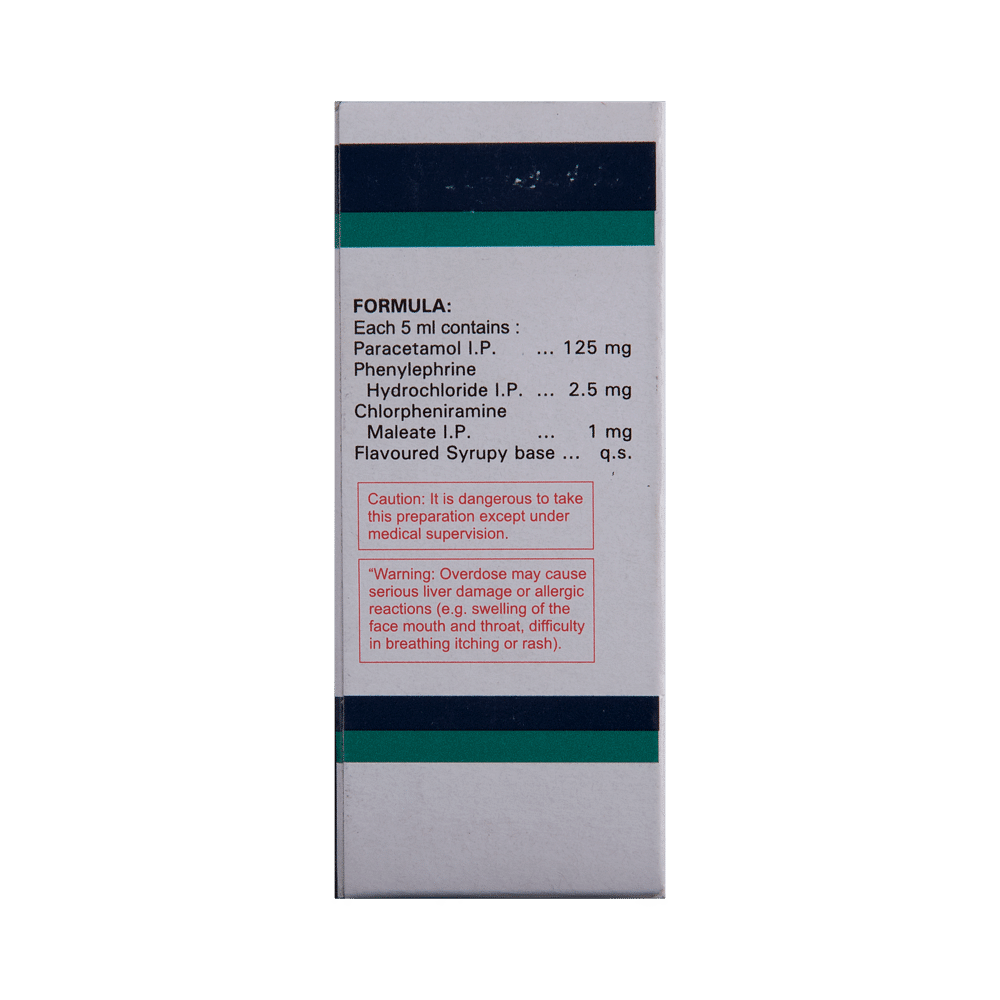
Kid O Cure Syrup
Manufacturer
Adept Biocare
Salt Composition
Chlorpheniramine Maleate (1mg) + Paracetamol (25mg) + Phenylephrine (2.5mg)
Key Information
Short Description
Kid O Cure Syrup is a medication used to treat common cold symptoms in children, such as sore throat, runny nose, cough, sneezing, watery eyes, body ache, and fever.
Dosage Form
Syrup
Introduction
Kid O Cure Syrup is a combination of three medicines: Chlorpheniramine, paracetamol, and phenylephrine. It is commonly prescribed in children to relieve common cold symptoms. Chlorpheniramine is an antiallergic that relieves allergy symptoms like runny nose, watery eyes, and sneezing. Paracetamol is an analgesic (pain reliever) and antipyretic (fever reducer). Phenylephrine is a nasal decongestant that narrows the small blood vessels providing relief from congestion or stuffiness in the nose.
Directions for Use
Kid O Cure Syrup is a medication that should be used under the guidance of a doctor. It is important to follow the dosage instructions carefully and not to exceed the recommended dose.
How it works
Kid O Cure Syrup is a combination of three medicines: Chlorpheniramine, paracetamol, and phenylephrine. Chlorpheniramine is an antiallergic that relieves allergy symptoms like runny nose, watery eyes, and sneezing. Paracetamol is an analgesic (pain reliever) and antipyretic (fever reducer). Phenylephrine is a nasal decongestant that narrows the small blood vessels providing relief from congestion or stuffiness in the nose.
Quick Tips
Kid O Cure Syrup may make your child feel sleepy. Ensure your child takes extra care when taking part in physical activities. Never combine Kid O Cure Syrup with other cold and flu medicines as that may lead to side effects. Stop Kid O Cure Syrup and immediately report to the doctor if your child develops an itchy rash, facial swelling, or breathing difficulties. Practice self-care tips: clean and disinfect surfaces after sneezing and coughing, give your child plenty of fluids, restrain your child from having dairy products, coffee, and foods that are spicy and fried, make your child gargle with warm saltwater, and ensure your child takes enough rest.
Related Medicines

Grilinctus Paediatric Syrup

Notril Plus Syrup

Medilocold Syrup

Sungesic Syrup

Korizyl Syrup

Apicold P Syrup

Efcold Syrup

Triaminic Plus 1 mg/125 mg/2.5 mg Syrup

Dolocold Syrup

Recold Syrup
Frequently asked questions
What if I give too much Kid O Cure Syrup by mistake?
Exceeding the recommended dosage of Kid O Cure Syrup can lead to serious side effects like seizures, rapid heart rate, depression, cognitive impairment, and difficulty concentrating. Always adhere to the prescribed dose. Utilize the calibrated measuring cup provided with the medicine for accurate measurements. Avoid using kitchen teaspoons as they may not deliver the exact dosage.
How can I store Kid O Cure Syrup?
Store Kid O Cure Syrup at room temperature in a dry, well-ventilated area away from direct sunlight or heat sources. Keep all medications out of reach and sight of children to prevent accidental ingestion.
My child has a cough and fever. Can I give him two medicines together?
Give your child no more than one cough or cold medication at a time unless specifically advised by their doctor. Combining multiple medications with similar ingredients may lead to an overdose, potentially causing serious adverse effects. Always consult your child's doctor before administering any medicine.
Can I give my child's cough medicine?
Never administer medicines intended for adults to children. Children must only be given formulations specifically designed for them, as this may lead to unwanted side effects. Always thoroughly examine the medication label before use on your child. Administer the dosage specified by their doctor, and if symptoms persist or fail to improve after treatment, seek professional medical guidance.
Can Kid O Cure Syrup make my child sleepy?
Kid O Cure Syrup may cause mild drowsiness in some children. Do not use it to induce sleep, as forced sleep could mask underlying sleep disorders such as insomnia. It's always recommended to consult your child’s doctor before administering the medicine.


